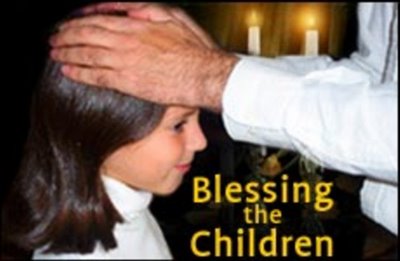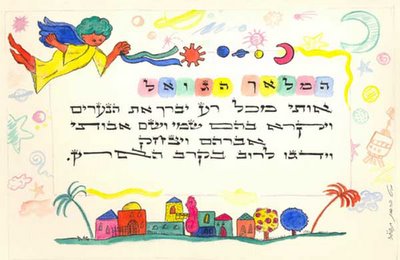Wednesday, January 11, 2006
BLESSING THE CHILDREN - Niggun [from the Parsha] of the Week
 Thanks to Aish HaTorah for this pic
Thanks to Aish HaTorah for this pic
-- Breishis, 48:16, 20
***

Once he [Shloime Dachs] called up a young child to sing an impromptu solo during a rendition of Shloime's famous "Hamalach." When the child began singing Dveykus' "Hamalach," without missing a beat, he finished the child's selection and then continued with his own.
 Thanks to Aish HaTorah for this pic
Thanks to Aish HaTorah for this pic*
HaMalach hagoel osi mikol ra, yevarech es ha’naarim, vikareh bahem shmi, v’shem avosai, Avraham v’Yitzchak. V’yidgu larov b’kerev ha’aretz…
…Vayevarchem bayom hahu leimor, Becha yevarech Yisrael leimor, Yesimcha Elokim k’Efraim vch’Menashe.
The angel who delivered me from all evil, may he bless the lads, and let them bear my name, and the names of my fathers, Avraham and Yitzchak. May they increase in the land like fish…
…And [Yaakov] blessed them on that day saying, “With you shall Yisrael [the Jewish People] bless, saying, ‘May G-d make you like Ephraim and Menashe.’ ”
…Vayevarchem bayom hahu leimor, Becha yevarech Yisrael leimor, Yesimcha Elokim k’Efraim vch’Menashe.
The angel who delivered me from all evil, may he bless the lads, and let them bear my name, and the names of my fathers, Avraham and Yitzchak. May they increase in the land like fish…
…And [Yaakov] blessed them on that day saying, “With you shall Yisrael [the Jewish People] bless, saying, ‘May G-d make you like Ephraim and Menashe.’ ”
-- Breishis, 48:16, 20
*
There is a lovely Jewish custom of the parents blessing their children, when the father comes from Shul [synagogue] on Friday night, using the second verse cited above. I’d like to share some thoughts on this blessing, from Reb Shlomo Carlebach, based on his “Shabbos in Shomayim” recording.
When we come home from shul on Friday night, we realize that something happened to our house – it’s full of angels. It’s not the same house. You know what angels are? Angels are, first of all, our children – the real angels. During the week, I think that they’re just children. But on Friday night, after I’ve purified my heart – after davening with all my heart, I come home and I realize, “Master of the World, how can I ever thank you for these beautiful angels that you’ve sent into my house?”
Then I say to my children, “boachem l’shalom” – children, when you come into my house, be in peace, let the world be filled with peace. Then, “barchuni l’shalom” – bless me, just because of you let me bring peace to the world, to the Holy Land, to every person. And then, “tzeis’chem l’shalom” – someday, our children will build their own homes. And the deepest question is only, “What am I giving my children on the way?” So I bless my children, someday when you leave my house, please take the Holy Shabbos with you. Do you know what kind of Shabbos I have? I have the Shabbos of my father and my grandfather. And he had the Shabbos of his grandfather, all the way to Moshe Rabbeinu and Avraham Avinu, till Moshiach is coming.
We bless our children, our angels. Rav Kook said that a sign that Moshiach is coming is that every day our children look more beautiful, deeper, sweeter than honey…
Before Kiddush, it’s the holiest custom, every father and mother, puts forth their hands. And even if, maybe, our hands are not shaking, but inside, inside, our hearts are shaking, our souls are shaking. And we’re blessing our children.
According to the great Kabbalists, you’re supposed to say the name of the child, and your name. Because, sadly enough, because Yitzchak Avinu didn’t know whom he was blessing, there was so much pain after that in the world. And we say to our children, “I want to bless you forever!” What kind of man or woman would I like you to be? I’d like you to be like Efraim and Menashe; like Sarah, Rivka, Rachel and Leah.
You know what’s so special about Jewish parents? For us, our children – there have never been such beautiful children in the world! And if you’ll ask me, is there anybody in the world I could compare my children to? Yes – like our holy Avos [fathers] and Imahos [mothers]. And we bless them.
You know, when my father would bless me, he would always sit. And I was a little boy and I would bend my head down, and my father would place his hands on me. I could feel my father shaking. And yeah, you’re supposed to keep your head down. But I’m a little boy, from time to time I wanted to look at my father’s face. And I always saw tears coming down from his eyes. I remember on Yom Kippur night, my father would bless me – a long blessing. The floor was always wet with tears.
So you know, my beautiful children, and all of your children: You know what kind of blessing we give you? We’re giving you the blessings all the way back to Yitzchak, all the way back to Rivka.
For more on blessing the children, see this from Aish HaTorah.
When we come home from shul on Friday night, we realize that something happened to our house – it’s full of angels. It’s not the same house. You know what angels are? Angels are, first of all, our children – the real angels. During the week, I think that they’re just children. But on Friday night, after I’ve purified my heart – after davening with all my heart, I come home and I realize, “Master of the World, how can I ever thank you for these beautiful angels that you’ve sent into my house?”
Then I say to my children, “boachem l’shalom” – children, when you come into my house, be in peace, let the world be filled with peace. Then, “barchuni l’shalom” – bless me, just because of you let me bring peace to the world, to the Holy Land, to every person. And then, “tzeis’chem l’shalom” – someday, our children will build their own homes. And the deepest question is only, “What am I giving my children on the way?” So I bless my children, someday when you leave my house, please take the Holy Shabbos with you. Do you know what kind of Shabbos I have? I have the Shabbos of my father and my grandfather. And he had the Shabbos of his grandfather, all the way to Moshe Rabbeinu and Avraham Avinu, till Moshiach is coming.
We bless our children, our angels. Rav Kook said that a sign that Moshiach is coming is that every day our children look more beautiful, deeper, sweeter than honey…
Before Kiddush, it’s the holiest custom, every father and mother, puts forth their hands. And even if, maybe, our hands are not shaking, but inside, inside, our hearts are shaking, our souls are shaking. And we’re blessing our children.
According to the great Kabbalists, you’re supposed to say the name of the child, and your name. Because, sadly enough, because Yitzchak Avinu didn’t know whom he was blessing, there was so much pain after that in the world. And we say to our children, “I want to bless you forever!” What kind of man or woman would I like you to be? I’d like you to be like Efraim and Menashe; like Sarah, Rivka, Rachel and Leah.
You know what’s so special about Jewish parents? For us, our children – there have never been such beautiful children in the world! And if you’ll ask me, is there anybody in the world I could compare my children to? Yes – like our holy Avos [fathers] and Imahos [mothers]. And we bless them.
You know, when my father would bless me, he would always sit. And I was a little boy and I would bend my head down, and my father would place his hands on me. I could feel my father shaking. And yeah, you’re supposed to keep your head down. But I’m a little boy, from time to time I wanted to look at my father’s face. And I always saw tears coming down from his eyes. I remember on Yom Kippur night, my father would bless me – a long blessing. The floor was always wet with tears.
So you know, my beautiful children, and all of your children: You know what kind of blessing we give you? We’re giving you the blessings all the way back to Yitzchak, all the way back to Rivka.
For more on blessing the children, see this from Aish HaTorah.
***

Pic is from Michal Bergman of Ein Hod, Israel
*
And now for our niggun. This week’s niggun, from the first verse cited above, HaMalach HaGoel Osi, has at least two versions. The first is from the group Dveykus, on Volume 4, composed by Abie Rottenberg. You can find the Hebrew words, the translation and the song itself here.
The second is the Shloime Dachs version. For an instrumental only rendition, try this.
The second is the Shloime Dachs version. For an instrumental only rendition, try this.
Once he [Shloime Dachs] called up a young child to sing an impromptu solo during a rendition of Shloime's famous "Hamalach." When the child began singing Dveykus' "Hamalach," without missing a beat, he finished the child's selection and then continued with his own.
*
IMPORTANT P.S.:
Everybody knows that on Simchas Torah, the custom is to give everybody in Shul an Aliya, to be called up to the Torah in honor of the celebration of its completion, and its beginning anew. In many shuls, even minors, under Bar Mitzva age, are called up individually and recite the blessings over the Torah. But what about those children who can't read and don't know the blessings?
*
The custom developed to call them all up together, in what is known as Kol HaNaarim - "all the youngsters." An adult, usually a father of one of the youngsters, is called up. A tallis [or several talleisim] is held like a canopy over the Torah table, and all the children recite the brachos [blessings] together with the man called up. Often, the blessings given by Moshe Rabbeinu to the tribes of Yosef [Menashe and Efraim] is read. And then, after it's finished, the gabbai - or in some places, the entire congregation - blesses the children with our niggun of the week: HaMalach HaGoel Osi. In our shul here in Yerushalayim, and I'm sure in several other locations, we all sing it to the Dveykus tune mentioned above.